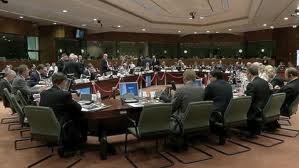There are few terms that evoke greater distrust among many wise and sceptical people on both sides of the Atlantic right now than ‘faith-based politics’. A large part of that distrust comes from an awareness of the potency and even toxicity that can arise from religious or ideological emotion and commitment – and not just among those whose beliefs (religious or otherwise) are other than, or opposite to, our own….
I’m a liberal, but I don’t want to be in a liberal church, because liberals unchecked are prone to do stupid things. And I think the same holds true for conservatives that want to make a ghetto for themselves on the right. These would be terrible developments for the church to split ourselves the way some on the right are advocating. In the kingdom of God, the church will have every ideological stripe.
The author of Ephesians is addressing the conflict between Jew and Gentile Christians (“the cut/circumcised” and “the uncut/uncircumcised”). The politics of this text could be boiled down to the first century conflict between these two groups. It’s a definition so basic and so simple that it belongs in a Politics 101 course. Where it gets interesting, however, is not how one defines the conflict, but how the author of Ephesians deals with it…..
The conservatives did what they had to do to win. They ran out the clock, wore people down, kept their troops in line, and ultimately prevailed thereby. Not letting the Assembly debate the issue of the Authoritative Interpretation, however, is going to be a costly mistake. My sense is that commissioners thought that this is something like the ordination question that we debated for so many years. People could get only so far in one Assembly on that issue, but would reach an impasse, whereupon folks would realize that it would just have to wait until the next Assembly to get to the next step. But marriage is very different from ordination. Councils of the church perform ordinations, so you have to get a group of people to agree to move forward. Marriages, however, are performed by individual pastors. And the emotion surrounding a marriage is way higher than any ordination.
When the Committee on Middle East Peace finally made its motion to divest–you guessed it– a substitute motion was made, not divest but rather to invest in the Occupied West Bank. This was a masterstroke of polity, but a completely ridiculous proposal of policy. Presbyterians suffer from congenital niceness, which is the main reason that it had taken us eight years even to get to the point where we could make the least confrontational action possible on the issue, selling our own stocks and bonds.
This was my first experience of how the conservatives would use parliamentary maneuvers to block what was shaping up to be a progressive assembly by proposing study after study, utilizing minority reports and substitute motions designed to keep the Assembly from making decisions or even hearing about some important issues for as long as possible, if at all.

WRITING some 50 years ago, Archduke Otto Hapsburg, the last pretender to the crowns of Austria and Hungary, warned that economic cooperation alone would not satisfy the peoples of Europe and that European unification could not succeed unless it was imbued with an abstract principle. Only something as mystical, he wrote, as the Holy Roman Empire could give people hope, a sense of religious renewal and combat the pernicious effects of local interest, chauvinism, xenophobia and racism. Today’s European crisis indeed shows that great political institutions cannot be constituted solely on a rational basis or through the bureaucracy and incrementalism of Brussels.
What might happen if we read the Gospels afresh not from the perspective of distant struggles for justice or objectified notions of ‘the poor’ (as if ‘they’ were no more than a category) but from the perspective of those in our cities and towns who are considered ‘worthless’, part of an ‘underclass’, ‘surplus labor’…..?
